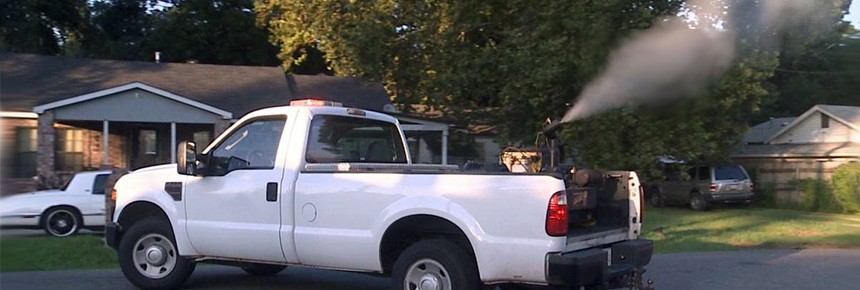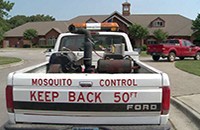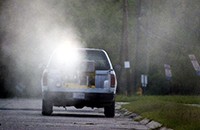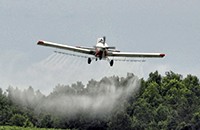
Ground spraying for mosquitoes

Next ground spraying Wednesday, October 09, 2024
In response to three West Nile virus (WNV) positive mosquito samples from unincorportated Tarrant County in Precinct 3 and Precinct 4 near Park Ridge Trail, Linkhill Drive and Ruth Court, Tarrant County Public Health will, weather permitting, conduct ground spraying at these locations on Wednesday, October 9 from 9 p.m. to 5 a.m., after all appropriate resident notifications have been completed.
To date, 4,492 samples have been tested through Public Health's North Texas Regional Laboratory. Seven hundred and sixty-nine samples from the Tarrant County region have tested positive for WNV including: Arlington (65), Bedford (13), Benbrook (8), Burleson* (76), Colleyville (31), Crowley (8), Dalworthington Gardens (2), DFW Airport* (4), Euless (44), Fort Worth* (264), Grand Prairie* (13), Grapevine (23), Haltom City (25), Haslet (3), Hurst (22), Keller (25), Mansfield* (37), North Richland Hills (28), Pantego (17), Richland Hills (6), River Oaks (7), Southlake (7), Unincorporated (36), Watauga (4), and Westover Hills (1).
*May contain positives from Johnson County, Denton County or Dallas County.
This interactive mosquito dashboard shows when and where ground spraying for mosquitoes took place or will occur in Tarrant County.

About Mosquito Abatement
Each municipality in Tarrant County is responsible for mosquito abatement (control toward reduction) within their city limits. Tarrant County Public Health (TCPH) works with these cities to monitor mosquito activity and offers mosquito control recommendations, although the decision to start or stop any mosquito control activity is made by the city's governing body.
Public Health is responsible for mosquito abatement within the unincorporated areas of Tarrant County.
The abatement program involves the deployment of more than 1,000 mosquito traps in most Tarrant County cities. Mosquito traps are provided free of charge to the cities. The trapped mosquitoes are brought to TCPH where the mosquitoes are sorted, or "pooled" (separated out by species) and tested for the presence of West Nile Virus (WNV) and other mosquito-borne diseases.

Municipality leaders are notified if disease-positive samples are found in their city. Public Health will advise them on what action they can take regarding these positive mosquito pools. If positive pools are found in an unincorporated area, Public Health will arrange for that area to be ground sprayed and will notify residents around the area prior to the spraying. Ground spraying notices are also posted on this webpage and Public Health's social media channels.
Further abatement activities
- TCPH currently employs Texas Department of Agriculture-licensed personnel in the mosquito abatement program.
- TCPH will adulticide (treat for adult mosquitoes) in the unincorporated area where disease-positive mosquito pools are found.
- TCPH does not adulticide for nuisance (non-disease-carrying) mosquitoes but will treat ANY water source containing mosquito larvae with various types of larvicide (treatment for larval mosquitoes).
- TCPH will larvicide a body of water if mosquito larvae are present and no natural predators are found in or near that body of water.
- TCPH may adulticide for multiple consecutive nights if it is determined that there is an elevated risk to humans (for instance: multiple positives pools are found in the same area and there are confirmed human cases of WNV).

Ground spray notices
Prior to any ground spraying in unincorporated areas, Tarrant County Public Health will notify the area's residents via signs placed at all entrances to the area. Announcements are also posted on TCPH's website and social media. The interactive mosquito dashboard map also provides notice.

About aerial spraying
Should West Nile Virus-positive mosquito pools become excessive --and more people become sick, Tarrant County Public Health will notify the affected region prior to any aerial spraying taking place.
In situations where large scale aerial spraying is necessary, the FDA and EPA-approved chemical Dibrom (also known as Naled) is used.
Aerial Spraying for Mosquitoes in Tarrant County - Frequently Asked Questions


Further information
Arboviral Surveillance and Mosquito Control Program policies
A “vector” is an animal that can carry and transmit disease to another animal. A mosquito is considered a vector of concern because a mosquito can carry and transmit diseases to humans. More on vector control.


 TARRANT COUNTY, TX
TARRANT COUNTY, TX

 Environmental Health
Environmental Health